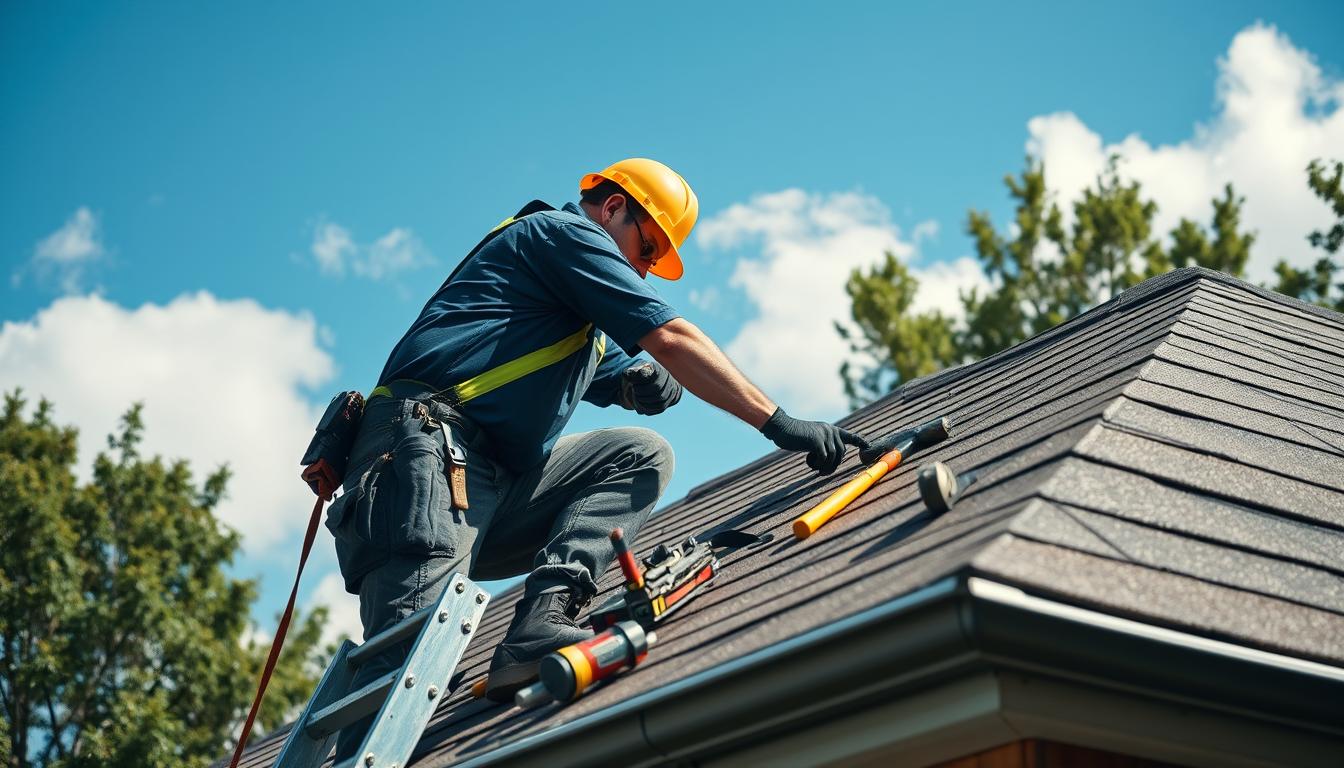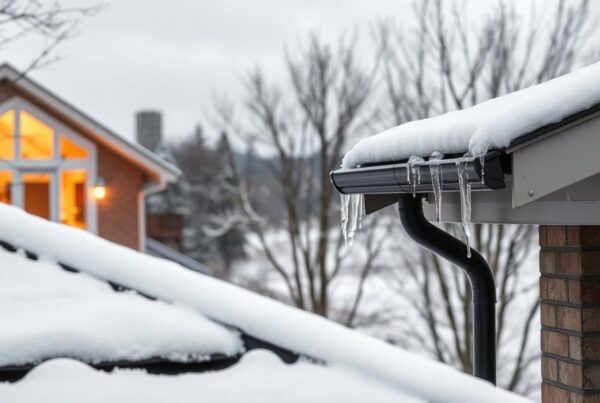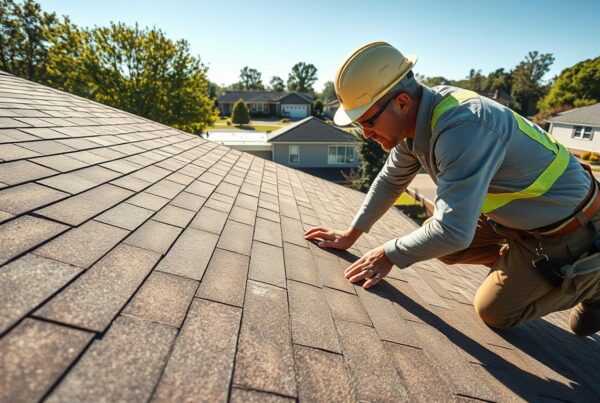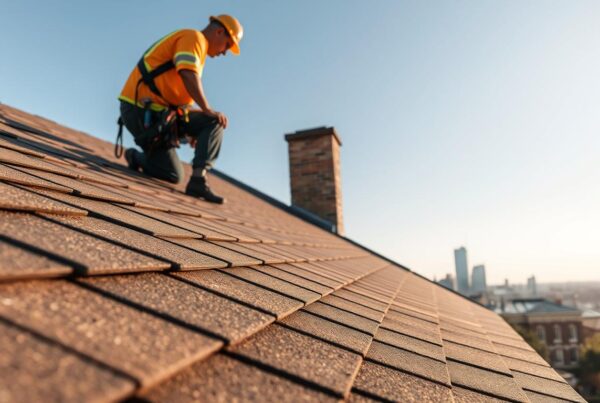Looking at a roof project can feel overwhelming. Your roof keeps your home safe from weather. It also makes your house look good and saves energy. In Charlotte, NC, you really need a strong roof because the weather changes a lot. This part will help homeowners understand their roofing project. It explains why you need expert help and how to pick the best roofers. “Hard Roof,” located at 2125 Mckenzie Creek Drive, is famous for its top roofing work in Charlotte. You can call them at 980-351-7226 for help with any roof problems in the area.
Key Takeaways
- Understand the importance of hiring professional roofing contractors for your projects.
- Learn the key criteria for selecting trusted roofing professionals.
- Discover the benefits of opting for local Charlotte NC roofing solutions.
- Equip yourself with expert roofing advice to ensure a successful roof project.
- Navigating your roofing project becomes easier with the right knowledge and partnerships.
Understanding the Importance of Hiring a Roofing Contractor
Hiring a professional roofer is key for your home’s long life and safety. A good contractor protects your home and makes sure your roof meets all rules. We’ll look at why it’s important to pick the right roofer in Charlotte.
What to Look for in a Roofing Contractor
It’s not enough to just pick any roofer. You need to check a few important things:
- Licensing and Insurance: Make sure they’re fully licensed and have insurance. This protects you.
- Proven Track Record: Choose contractors known for doing well in your area.
- Customer Reviews: Reading reviews and asking for references helps you know if they’re good.
- Written Estimates: Always get quotes in writing from a few places to compare.
The Benefits of Hiring Local Contractors
Choosing local roofing experts in Charlotte has many benefits:
- Knowledge of Local Building Codes: They know Charlotte’s rules well, so your roof will meet all requirements.
- Weather-Specific Expertise: Local roofers suggest materials that last in your weather.
- Community Reputation: Because their reputation in the community matters, they tend to provide better service.
Keeping these things in mind will help you find a great roofer. Quality service is key for a safe and valuable home. This is especially true with local pros you can trust.
Assessing Your Roofing Needs
Check your roofing needs before you call a contractor. It’s key to know what you want. You’ll make better choices about materials, money, and finding damage. Knowing these details helps you talk clearly with experts and understand your project better.
Different Types of Roofing Materials
It’s important to think about roofing material options. There are many types, like asphalt shingles, metal, clay tiles, and more. Each type has its own perks regarding how long they last, cost, and how they look:
| Material | Durability | Cost | Aesthetic |
|---|---|---|---|
| Asphalt Shingles | 20-30 years | Affordable | Varied Styles |
| Metal Roofing | 40-70 years | Moderate to High | Modern Look |
| Clay Tiles | 50+ years | High | Traditional Appeal |
| Slate | 75+ years | Very High | Elegant Finish |
Determining Your Budget
Planning your budget for the roof is a big part of the job. Think about the costs of materials, work, permits, and surprises. A good budget stops money worries. Getting many quotes helps compare cost and value for each roofing type.
Identifying Signs of Roof Damage
Finding roof damage early can save a lot of money later. Look for missing shingles, ceiling water stains, or gutter granules. Fixing problems fast keeps your roof strong. It stops small troubles from getting big.
Questions to Ask Your Roofing Contractor
When you pick a roofing contractor, it’s key to ask the right questions. This ensures you get a pro who’s up to the task. Let’s dive into what you should talk about with them.
Inquiring About Experience and Expertise
It’s important to know how skilled your roofing contractor is. Ask how long they’ve been in the business. Check if they’ve worked on roofs like yours. Also, see if they have any special training or certs. This will show if they’re good for your project.
Understanding Warranties and Insurance
Make sure you know about the contractor’s insurance and warranty offers. Their insurance should cover both worker’s comp and liability. This keeps you safe from any mishaps. Also, learn about the warranties for materials and work. This info will make you feel secure about your roof’s future.
Asking for References and Past Work
Seeing a contractor’s past jobs helps judge their work and trustworthiness. Ask for feedback from their previous clients. Look at photos of their work before and after. Good contractors will happily share this, proving they care about doing well.
Here’s a table to compare different contractors easily:
| Criteria | Contractor A | Contractor B | Contractor C |
|---|---|---|---|
| Years of Experience | 15 | 10 | 20 |
| Certifications | Yes | No | Yes |
| Insurances | Full Coverage | Basic Coverage | Full Coverage |
| Warranties | 10 Years | 5 Years | 15 Years |
| Customer References | Yes | Yes | Yes |
The Roofing Installation Process Explained
Knowing how roofing installation works is key for setting your expectations right. From the first check to putting shingles, each step needs careful planning and doing. Being informed lets you handle disruptions and know how long things will take.
Steps in Residential Roofing Installation
The residential roofing process has several important steps. Here is a simple guide to understand each part:
- Initial Inspection: A detailed check finds any hidden problems and figures out the work needed.
- Preparation: Taking off old roofing stuff and preparing the roof base makes for a firm start.
- Installation of Underlayment: Putting on a waterproof layer keeps your roof safe from water damage.
- Shingle Placement: Shingles are put on carefully and made secure. This is what keeps your roof safe.
- Final Inspections: Checks after the job confirm that everything is in place and done right.
Timeline Expectations for Roofing Projects
Managing the schedule for roofing work is very important. How long it takes can change for many reasons:
- Project Size: Bigger roofs need more time to finish.
- Weather Conditions: Bad weather can cause delays.
- Material Choice: Some roofing stuff might need more time to get ready and put up.
Usually, roofing work can be done in a few days to a week. Talking often with your contractor helps you stay in the loop and plan better.
Tips for Choosing the Right Roofing Material
When selecting roofing materials for your home, consider looks, use, and how long they last. The best choice makes your home look better and work better for Charlotte weatherproofing.
Pros and Cons of Common Roofing Materials
Knowing the good and bad of common roofing materials helps you choose wisely. Here’s how they compare:
| Material | Pros | Cons |
|---|---|---|
| Asphalt Shingles | Cost-effective, easy to install, widely available | Shorter lifespan, less eco-friendly |
| Metal Roofing | Long-lasting, energy-efficient, recyclable | Higher upfront cost, can be noisy during rain |
| Clay Tiles | Durable, excellent for hot climates, aesthetic appeal | Heavy, expensive, may require additional framing |
Energy Efficiency Considerations
Choosing energy-efficient roofing materials can cut down on energy use. Metal roofs reflect the sun’s heat, keeping homes cooler. This leads to lower energy bills. Clay tiles also insulate well, keeping Charlotte homes cool in summer.
Weather Resilience in Charlotte
Charlotte’s weather requires roofing that can handle hot summers and sometimes harsh winters. Charlotte weatherproofing is important. Metal and clay tiles are excellent in these conditions. They stand up to rain, wind, and temperature changes well. These options also last long, which is great for future savings.
The Importance of Regular Roof Maintenance
Regular roof checks are key to keeping your home safe and strong. They help spot small problems early. This way, you save money and keep your house secure.
Recommended Maintenance Practices
It’s important to look after your roof often. Here are some top tips:
- Inspect your roof at least twice a year, preferably in spring and fall.
- Clear debris such as leaves and branches to prevent clogging of gutters.
- Check for any loose or missing shingles and replace them promptly.
- Ensure proper ventilation in your attic to avoid moisture buildup.
- Trim overhanging tree branches near your roof.
- Look for and seal any cracks in the roofing material.
Signs That Maintenance Is Needed
Knowing when to fix your roof is important. Look for these warning signs:
- Missing or damaged shingles: Gaps in shingles can cause leaks.
- Water stains: Stains in your attic or ceiling mean leaks.
- Granules in gutters: Too many granules show your shingles are wearing out.
- Sagging roof: This suggests a big problem with your roof’s structure.
- Moss or mold growth: These can badly damage your roof if ignored.
Watch for these signs and keep up with roof care. It helps make your roof last longer and keeps your house safe.
Navigating Roofing Permits and Regulations
When you’re working on a roof in Charlotte, there’s more to it than choosing materials. Understanding local building regulations and getting the right roofing permits Charlotte is crucial. This step keeps you away from legal trouble and fines.
Understanding Local Building Codes
Charlotte’s building codes make sure that roofing projects are safe and up to standards. These codes cover the type of materials, how to install them, and safety rules. Always check the local building regulations before you start. This ensures your project doesn’t get delayed.
When to File for a Permit
You need to know when a roofing permit is required. For big jobs like replacing the whole roof or major repairs, permits are a must. Talk to your contractor or local building officials. They’ll tell you if you need a permit for your project. Getting your necessary roofing documentation ready beforehand is important. It keeps your project on track.
| Type of Work | Permit Required | Notes |
|---|---|---|
| Full Roof Replacement | Yes | Includes tear-offs and new installations |
| Minor Repairs | No | Usually covers patching or minor tile replacements |
| Structural Changes | Yes | Any alteration to the roof’s structure |
The Cost of Roofing Projects in Charlotte, NC
Roofing is a big cost for many. Knowing what changes the price is key for budgeting. In Charlotte, the price changes based on material, roof size, and how complex the job is. This section gives average costs for materials. It also explains things that change the total price. This helps you guess your costs better.
Factors Affecting Roofing Costs
Several things can change how much roofing costs. Knowing these can help you understand prices in Charlotte better:
- Roof Size: Bigger roofs need more stuff and work, which means they cost more.
- Material Choice: The type of material used can change the price a lot. Fancy materials are more expensive.
- Labor Complexity: Roofs that are hard to work on might need special skills. This can make labor cost more.
- Permits and Inspections: Getting the right permits and passing inspections can add to the cost.
Average Pricing for Different Materials
Average costs for materials help you think about your budget. Here’s some common materials and what they usually cost in Charlotte:
| Material | Average Cost per Square Foot |
|---|---|
| Asphalt Shingles | $3.50 – $5.50 |
| Metal Roofing | $5.00 – $12.00 |
| Wood Shakes | $6.00 – $9.00 |
| Slate Tiles | $10.00 – $20.00 |
| Clay Tiles | $8.00 – $18.00 |
By looking at these prices and factors, you can pick wisely. This lets you manage your roof costs better. Remember these points when planning. They help make sure your roofing project goes well.
How to Evaluate Roofing Contractors’ Quotes
Looking at roofing contractors’ quotes can feel overwhelming. It’s key to know the services and watch out for hidden fees. This guide helps you look over and compare quotes well.
Comparing Services Offered
When looking at roofing quotes comparison, don’t just focus on the total cost. Check what each quote covers. You should look at:
- Materials: Make sure every quote has the same roofing materials.
- Labor: See if the cost of labor is included and covers all work needed.
- Warranty: Look at the warranties for materials and work.
- Cleanup: Check if they will clean up and take away old materials.
Understanding Hidden Costs
It’s easy to miss hidden fees in quotes. Knowing these helps avoid extra costs later. Here’s what to keep an eye on:
- Permit Fees: Some quotes don’t include the cost for local permits.
- Extra Labor Charges: Unexpected problems might add to the labor cost.
- Material Upgrades: Make sure you understand any changes to materials.
- Additional Services: Things like gutter work or insulation may not be in the quote.
| Service Detail | Included in Quote | Potential Hidden Fee |
|---|---|---|
| Material Costs | Yes | No |
| Labor for Removal and Installation | Yes | Possible if complications arise |
| Permit Fees | Sometimes | Often |
| Disposal and Cleanup | Varies | Possible |
By carefully reviewing each quote and asking the right questions, you’ll understand the estimates better. Always clear up any confusion to make the best choice and avoid unexpected fees.
Final Thoughts: Planning Your Roofing Project
Taking on a roofing project is a big task. But, good planning and talking clearly can make it smooth. Prepare by making a timeline and talking openly with your contractor. These steps will help your roofing project succeed.
Setting a Timeline for Your Project
Planning your roofing project starts with a timeline. Talk about your goals with your contractor. Work together to make a schedule. This should cover from the start to the last cleanup. It keeps the project on track. Be ready for delays from weather or surprises.
Communicating with Your Contractor
Talking well with your contractor is key. Get updates and talk often to avoid confusion. Discuss important things like progress, any problems, and changes needed. A good relationship with your contractor helps solve issues fast. It keeps the project going smoothly.
Good planning and clear talking make a roofing project go well. Set a clear timeline and keep talking with your contractor. You’ll reach your roofing goals with confidence.





